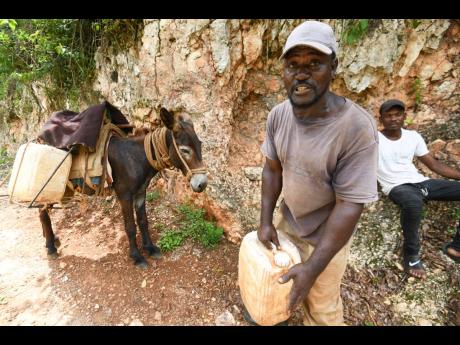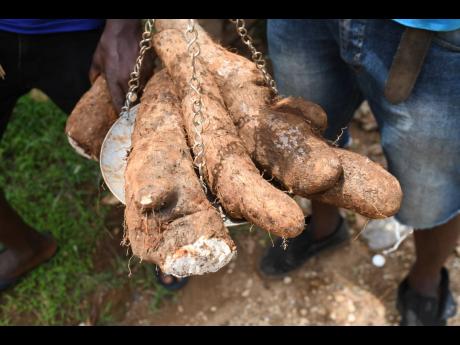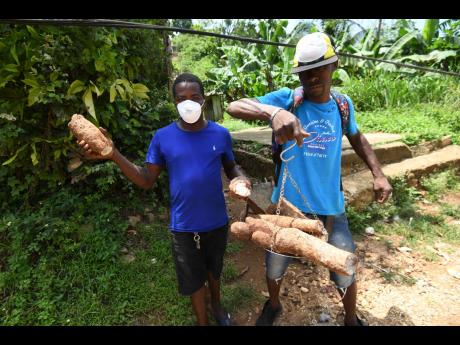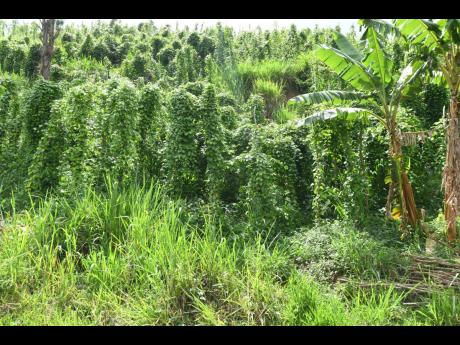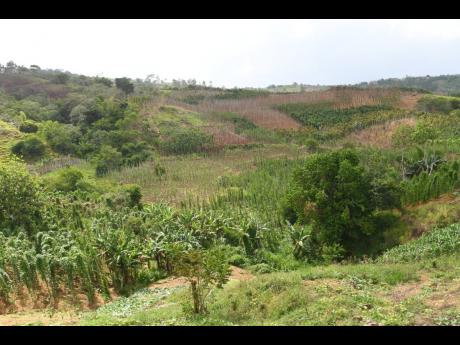‘We will feed the nation’ - Trelawny farmer has no regrets after giving up city life
Denton Brown wore a look of optimism on his face as he led his newly purchased brown donkey on to the main road in Sawyers, Trelawny. He had just 'watered' his few heads of cattle and was heading to his yam field to put in more hours.
Until a few years ago, Brown was in the hustle and bustle of Kingston, operating as a taxi driver. Returning to his native Sawyers was the furthest thing from his mind. But that changed after he assessed his situation and decided he was wasting his life in the city.
Brown, 51, said he spent most of his life in Kingston, having arrived there from he was a "yute". He said that he acquired the skill of furniture making at the HEART Academy in Portmore, St Catherine, but turned to building caskets after people found it more attractive to shop on hire purchase at Courts rather than to buy from small furniture makers.
"Once supm fail yuh, nuh bother give up," he said, "Yuh affi just move on."
FAR FROM CITY LIFE
Now back in Trelawny, Brown has been tilling the soil for the past eight years. When he is not giving water to cows, he is chopping sticks for his yam banks, planting the tuber or tending to his sweet potato field. This, he said, is a far cry from the city life to which he had become accustomed.
"When yuh deh a dem place, is like man waah yuh think different. Yuh have some man who make it seems yuh fi a work fi dem. Every corner yuh turn, man waah $50 or a $100 ... . Me deh yah suh and me couldn't tell when me see a man come beg me a beer," Brown said.
His focus now is on producing as much yam as he can for both the local and international markets. Brown said he exported 6,000 lbs of yams last year, having planted 2,500 banks of the tuber. This year he has increased the number of yam banks for 4,000, and he is convinced that Jamaica's food security is in good hands and farmers across the country have been working overtime to increase their output. His only concern at this point is whether the export market, which takes most of his yam, will remain viable.
"Me nuh know wah a guh happen ... Fi wi yam a guh ripe by July/August, and if the COVID-19 still a gwane weh the export system tight, then maybe we get knock, because me nuh think the market a guh can manage the amount a yam weh a come een at the time," Brown said.
However, Floyd Green, junior agriculture minister, said that farmers like Brown should not be dismayed.
"We cannot get enough yams. We have an exporter from Manchester that has demand for five to eight containers each week and they are unable to fulfil the total demand. So I would say, plant. Plus, the ministry has shown its commitment to help farmers find new markets through our mobile markets, and it has worked tremendously for our yam farmers," the minister said.
Agriculture has been touted as a potential growth area for Jamaica during and after the COVID pandemic.
Fitzroy Tinglin and Oneil Blake, residents of Mahogany Hall in Trelawny, have suffered fallout from the traditional areas of employment. Blake lost his job as a housekeeper in a hotel on the north coast; and Tinglin, a taxi driver, now finds it unprofitable to operate as there are fewer passengers on the road.
They now offer toy yam for sale at the side of the road in their community.
"I think these are the yams that our foreparents ate to make them strong and live to the age that we are not going to live," Tinglin said.
His story is that his grandfather found one 'yam head' on a sugar plantation decades ago and planted it. That one 'yam head' has turned to mountains and mountains of highly sought-after yam.
"It's a blessing. From last week we are digging yam ... . We are feeding the country," Tinglin said, adding that passers-by and community members alike purchase up to 100lbs of yam from them each day.






























